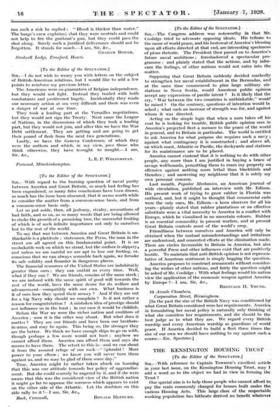[To the Editor of the SPECTATOR.] Sia,—With regard to the
burning question of naval parity between America and Great Britain, so much bad feeling has been engendered, so many false conclusions have been drawn, so much has the issue been obscured, that it seems worth while to consider the matter from a common-sense basis, and from a common-sense basis only. • Let us put aside, then, all jealousy, rivalry, accusations of bad faith, and so on, as so many weeds that are being allowed to choke the growth of a promising tree; the successful fruiting of which is of such infinite' importance not only to ourselves but to the rest of the world.
to say that war between America and Great Britain is un- thinkable is a platitude ; statesmen, the Press, the man in the street are all agreed on this -fundamental point. It is an unshakable rock on which we stand, but the surface is slippery, and unless we are careful we are apt to lose our footing, or, conscious that we can always scramble back again, we forsake its safe solidity and flounder in dangerous places.
The financial resources of the United States are indubitably greater than ours ; they can outbid us every time. Well, what if they can ? We are friends, cousins of the same stock ; we are imbued with the same spirit of good will towards the rest of the world, have the same desire for its welfare and advancement—compatibly with our own. What business is it of ours how they spend their money ? And if they are out for a big Navy why should we complain ? Is it not rather a reason for congratulation ? A mistaken idea of prestige should not influence us in the least ; in our case it would be childish.
Before the War we were the richer nation and creditors of America ; now it is the other way about. But what does it matter ? They are our friends and have been our brothers- in-arms, and may be again. This being so, the stronger they are the better. We think we have enough ships to go on with, though perhaps a few more would not hurt ; anyhow we cannot afford them. America can afford them and says she means to have them. The retort to this is—and we can shout it from the assured refuge of our rock—" Splendid ! More power to your elbow ; we know you will never turn them against us, and we may be glad of them some day."
True, America might be rather taken aback on learning that this was our attitude towards her policy of aggrandise- ment. But she could scarcely be angered by it, and if she were aware that this was the considered view of the British nation it might go far to appease the soreness which appears to exist on the other side of the Atlantic. Let the doubters on this. side rally to it !—I am, Sir, &c., Rock, Cornwall. RONALD HEPBURN.






































 Previous page
Previous page